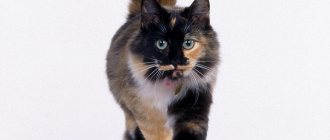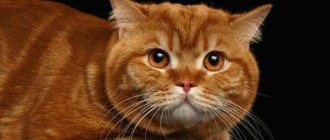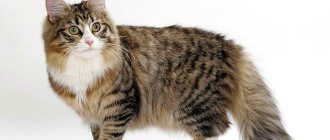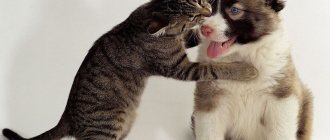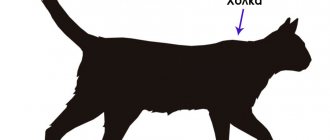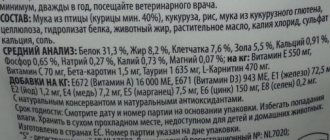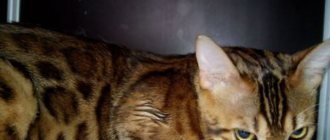Author: ProfGid
From Lat. felinus - feline and other Greek. logos - word, teaching. By the way, in 2021, the ProfGid career guidance center developed an accurate career guidance test. He himself will tell you which professions are suitable for you, and give an opinion about your personality type and intelligence.
A felinologist is a specialist in domestic cats.
Features of the profession
Felinology is a branch of zoology. Many people love cats and know how to care for them. But first of all, the word “felinologist” means owners of catteries (breeders), leaders of purebred cat clubs and, of course, experts working at cat shows.
An ordinary owner of a cat with a good pedigree can become a breeder.
The head of the nursery is, in theory, a specialist in the breeding and selection of cats.
An expert felinologist is an expert in cat breed standards.
Also, felinologists include specialists in the pet industry who produce food, vitamins for cats and care products for them (shampoos, medications, etc.).
Initially, cats were assigned the role of protectors of the house from mice and rats. And many of them are still doing this successfully, and not only in villages. For example, mustachioed guards protect Hermitage exhibits from rodents. The mousecatcher watches over the peace of the British Prime Minister at his residence on Downing Street.
However, most modern domestic cats, both purebred and mongrel, have never seen a mouse. Their main role is to delight their owners with their presence.
So, unlike dogs, the role of cats in the national economy is small. But the more purebred the cat, the more promising it is for an exhibition career. Many cat lovers are actively involved in the exhibition “game”: they show off their cats and collect diplomas.
Success requires a cat that meets the standards with a good pedigree and a competent judge. The higher a cat’s ratings at various shows, the more promising it is for breeding. And the higher the reputation of the breeder who raised her. The higher the reputation, the more valuable the kittens from his cat (or cats).
On the other hand, a certified show judge is constantly under the close attention of breeders and ambitious owners of participating cats. Every owner knows perfectly well the breed standards of his pet, and an expert has no right to make mistakes.
In a word, this is a system of mutual regulation. However, can felinology be called a profession? Opinions differ on this issue.
Hobby or profession?
In terms of the amount of labor invested, this is undoubtedly a profession.
For example, an expert felinologist (felinologist judge) must know in detail the characteristics of the breeds that he judges. The right to judge at exhibitions is given by a license. To get it, you need to have experience as a breeder and take many paid courses. Moreover, different breeds require separate training and licenses.
Breed standards are developed by the World Cat Federation (WCF). They describe in detail the characteristics (articles) of the breeds: features of the head, ears, body, paws, tail, coat. A point scale is given for each article. The felinologist judge must be well aware of these standards.
But, as the experts themselves say, you cannot live on the fees of a felinologist judge. “Payment for refereeing is not the most important part of our work,” they explain.
Therefore, a felinologist expert is most often an additional profession that can develop into a hobby.
At the same time, as Danish expert felinologist of international category Thomas Andersen says, the work of an expert felinologist opens up new horizons for a person: “I had been breeding cats for 15 years, when I suddenly realized that with such experience you can not only take care of your cats, but and judge others. No sooner said than done. I went to study. Then, when I started working as a judge, I discovered so many joys that I didn’t even know about! For example, the opportunity to travel. Experts travel around the world for free, and I like to say that my cats “carry me around.” (Magazine "Friend")
Breeding cats can bring significant income . Therefore, every year the number of people opening their own nurseries, clubs and associations is growing.
This is already animal husbandry (the so-called unproductive animal husbandry, which also includes cynology). But as already said, the breeder’s income depends on the quality of the kittens and the demand for them. And also from the inevitable overhead costs associated with the purchase and maintenance of breeding kittens.
The problem with this business is also that the higher the demand for the breed, the higher the competition. At the same time, breed fashion is changing, and this also affects commercial success.
The second problem is lack of knowledge. It is obvious if breeding work is carried out by yesterday's amateur. Pedigree breeding requires serious preparation.
A felinologist with a higher education who has graduated from the zootechnical or veterinary faculty can advise amateur felinologists. At the same time, he can head a club of any breed or association.
Mustachioed story
The domestic cat as we know it today is descended from the African wild cat, which has only recently been definitively established by scientists. The animal was domesticated by humans 10 thousand years ago. The reason was probably that cats hunted rodents, thus preserving grain reserves. From Ancient Egypt and the Middle Eastern countries, the cat came to Europe about 4400 years ago. As a result of natural crossing with wild representatives of the feline family, different breeds began to appear.
It must be said that cats were not always close to humans. For example, in Ancient Egypt they were considered a sacred animal, but in medieval Europe, mustachioed pets were associated with witchcraft and witches, and therefore were not approved by the church and were persecuted. In the 18th-19th centuries, cats were again in favor and became a fashionable hobby. It was at the end of the 19th century that the first selection work began. Already in 1871, the first cat exhibition took place in London.
Today cats are rightfully one of the most popular pets. Mustachioed pets do not require special care or large financial expenses, they feel great in an apartment and give a lot of positive emotions to their owners.
Training to become a felinologist
Universities
- Russian State Agrarian University - Moscow Agricultural Academy named after K. A. Timiryazev (RGAU-MS Agricultural University named after K. A. Timiryazev)
Faculty of Zoological Engineering,
Department of Zoology,
Specialization "felinology".
- Russian State Agrarian Correspondence University
Faculty of Zoological Engineering,
Specialization "felinology".
As well as regional universities in the agricultural sector:
- Ryazan State Agrotechnological University named after. P.A. Kostycheva
Faculty of Veterinary Medicine and Biotechnology
Specialty: Animal Science,
Specialization: cynology and felinology.
And other universities
Courses, seminars
- Courses and seminars on felinology can be taken at felinological clubs and federations.
For example, under the Russian Felinological Federation (RFF), the Felinological Association "Ros" (FAR), the International Association of Cat Fanciers Assolux, etc.
- The International Board of Expert Felinologists of the IFF also deals with improving the qualifications of judges and conducts seminars.
Universities
- Institute of Life Sciences and Biomedicine FEFU Food Biotechnology
4 years200,000 ₽/year
20 budget places
- Faculty of Biology and Biotechnology, National Research University Higher School of Economics Cellular and molecular biotechnology
4 years
400,000 ₽/year
30 budget places
- Faculty of Biological and Medical Physics MIPT Biotechnology
4 years
15 budget places
- Faculty of Science Biology
4 years
80,780 ₽/year
10 budget places
What should knowledge be?
A felinologist is not a synonym for a veterinarian. A specialist is not required to understand diseases, but he must know all breed standards approved by leading international cat associations.
His responsibilities include not only accurately determining whether an animal belongs to a particular variety, but also identifying the correct “breed” traits. In this area there are many external factors (color, paw length, head size and shape, height at the withers, ear structure, etc.) that determine the standards.
With such knowledge, felinologists are indispensable at competitions and at the stage of examining breeding kittens.
The salary of a specialist starts from 40-60 thousand rubles, and the upper limit, especially when working for a private employer, is not defined.
Variety of felinology profiles
Despite the fact that all felinologists study cats and have knowledge in the field of zoology and selection, there is a clear structure of profiles among specialists:
Anyone who decides to engage in this science must receive an appropriate education.
Evaluation of purebred cats
To determine whether an animal corresponds to the breeding properties of a breed, there are certain requirements that were established by experts in the process of development of felinology and selection of cats. These requirements are otherwise called “breed standard”. Thanks to the work of felinologists, there are many unique breeds, the purity of which is maintained and carefully monitored at exhibitions and in scientific institutes.
The main characteristics of the formed breed:
- all animals are descended from a limited number of ancestors;
- cats have similar physiological characteristics (tail length, eye color, sounds made, etc.);
- there is a large population obtained without inbreeding;
- the points at which the breed reproduces and spreads differ according to a number of climatic and geographical conditions;
- The traits characteristic of a given cat population are stable and inherited.
Feline associations located in different parts of the world differ greatly in the way they check the suitability of cats for a particular breed. But all of them can be divided into two groups: the first carry out their work according to the European judging system, the second - according to the American one.
The European system involves a closed assessment procedure.
The experts are in a separate room, where neither spectators nor even the cat owners themselves are allowed. After judging, animal breeders are given special evaluation sheets signed by the judges.
In the American system, a whole show is played out of determining whether an animal matches the breeding properties of the breed. It brings together cat owners and spectators. In public view, experts examine and check each animal for compliance with the breed, studying its appearance and behavior.
If at least part of the points of the standard are not observed or described incorrectly, there is a risk of inhibiting the development of the breed or even its disappearance.
Noun, number of synonyms: 2 zoology (33) cat science (2) ASIS Dictionary of Synonyms. V.N. Trishin. 2013 ... Dictionary of synonyms
AND; and. The science that studies cats. * * * FELINOLOGY FELINOLOGY (from Latin felinus feline and Greek logos word, doctrine), the science of domestic cats (see DOMESTIC CATS). Studies the anatomy and physiology of domestic cats,... ... Encyclopedic Dictionary
G. The scientific discipline that studies cats. Ephraim's explanatory dictionary. T. F. Efremova. 2000 ... Modern explanatory dictionary of the Russian language by Efremova
felinology
- felinol ogy, and ... Russian spelling dictionary
felinology
— (1 g), R., D., Ave. felinol/gyi... Spelling dictionary of the Russian language
felinology
- And; and. (English feline feline and lógos teaching) The science that studies cats ... Dictionary of many expressions
Felinology
- (felinus feline and Greek lógos teaching), the science of. Studies the anatomy and physiology of the domestic cat, its evolution, breeds, breeding and selection issues. A specialist who deals with felinology is called a felinologist... Encyclopedia “Animals in the House”
Classic calico cat Calico cat is a domestic cat with spots or partial coloring; Typically white fur with orange and black spots. English... Wikipedia
Head of the state institution “Publishing House of Karelia” (Petrozavodsk, Republic of Karelia) since 2000; born March 17, 1955 in Petrozavodsk; graduated from Petrozavodsk State University with a degree in... ... Large biographical encyclopedia
Books
- Felinology. Study guide, Tatyana Vladimirovna Blokhina, Thanks to this guide, the student will have an idea of the subject and tasks of felinology, the meaning of felinology and its connection with other branches of biology. The course of lectures covers issues... Category: Veterinary Series: Veterinary Publisher: Lan,
- Felinology. Tutorial. State stamp of the Ministry of Agriculture, Tatyana Vladimirovna Blokhina, Based on this manual, the student will have an idea of the subject and tasks of felinology, the importance of felinology and its connection with other branches of biology. The lectures cover questions... Category: Textbooks for Universities Series: Veterinary Medicine Publisher:
A person who studies the behavior of domestic cats and cats is a felinologist. How to learn this profession, and what knowledge should a specialist have? Where do felinologists work and is there a high demand for them?
Animal psychologist
People go to psychologists and psychotherapists to share their fears and talk about their mental trauma and problems. Animals cannot do this. Therefore, the task of a zoopsychologist is to understand and decipher the behavior of the animal, find the cause of the problem and do everything possible to eliminate it.
This profession is more often chosen by girls. An animal psychologist works on the following issues:
- aggressive behavior of the animal;
- problems with urination;
- fears;
- stress suffered by the pet.
The responsibilities of a zoopsychologist include the following:
- Eliminating conflict between the owner and the animal, establishing contact.
- Finding the cause of your pet's strange behavior.
- Behavior adjustment and support during the period of social adaptation.
- Consulting the animal owner on the proper care and maintenance of the pet to eliminate any problems that may arise.
Interesting details in the video:
What does a dog handler do?
There are three areas of dog breeding: service (military, police, guard, shepherd, sled dog, patronage, etc.), hunting (fishing and sports) and decorative. Dog handlers usually specialize in one of these areas.
A dog handler can breed dogs and focus on the quality of appearance and health. He monitors whether the puppies meet the breed standards or, on the contrary, tries to breed a new breed, trying to achieve some special qualities
Working in service dog kennels, dog handlers breed, raise and train guide dogs for the blind, rescue dogs or service-search dogs (depending on the profile of the kennel).
Dog trainers train dogs: instill obedience and teach commands. Such specialists work in kennels, at kennel clubs or privately.
Dog training goals
Training goals may vary. And it is not only dogs of the so-called service breeds such as shepherd dogs or Labradors who perform service.
For example, a toy spaniel-type dog can be trained to look for harmful mold in homes. Or train him as a therapy dog. Canis therapy - also called dog therapy or therapeutic canine therapy - is a good assistant in raising children suffering from Down syndrome, cerebral palsy and other neurological ailments.
In 1961, American psychiatrist Levinson found that communication with dogs improves coordination of movements, develops emotionality, memory, etc.
Abroad, in some hospitals, dog therapy is even used to bring patients out of comas: shaggy therapists are specially brought to the intensive care unit, where they communicate with patients.
In Russia, unfortunately, this area is not very developed, although there are already specialists in canis therapy. For example, in Moscow there is a program where dogs are trained in a special course for therapy dogs.
In a hotel or shelter, the main task of a dog handler is to create comfortable conditions for his guests.
In shelters, in addition, dog handlers organize treatment for dogs and, if possible, place them in good hands.
But what comes to mind first when you hear the word “dog handler”? Of course, the image of a brave guy with a sniffer dog on a leash.
Indeed, dog handlers perform a very important service in law enforcement agencies.
Here the dog handler and the dog are a single team, the success of which depends on the skills of both. Therefore, training is aimed at special canine skills.
The police use dogs to search for explosives and drugs, to track down criminals, and to maintain public order. At the Ministry of Emergency Situations, dogs help in rescue operations: they look for people under rubble, in hard-to-reach and deserted places. In customs and border departments, animals help specialists fight smuggling.
British Shorthair
This is one of the oldest English breeds, whose history dates back two thousand years. Their ancestors lived side by side with the ancient Romans, who valued them for their well-developed hunting instinct and incredible endurance. Over time, they found their way to Northern Europe and Great Britain. English breeders became seriously interested in these animals and began to work closely on their breeding. In 1871, an official breed standard was developed.
British Shorthairs are medium-sized cats whose weight does not exceed 8 kg. Thanks to their massive compact body and large rounded head, they give the impression of large cats. The entire body of a typical Briton is covered with elastic hair, under which a thick undercoat is hidden. As for the color, it can be almost anything.
The British Shorthair is one of the best cat breeds for apartments. These are very flexible, affectionate and relatively calm creatures that do not require complex care or special nutrition. They are not prone to damaging furniture and meowing excessively, and thanks to their extreme cleanliness, they quickly become accustomed to the litter box.
Russian blue
The exact origin of these animals still remains unknown. According to one version, they were brought to England from Russian Arkhangelsk and aroused serious interest among the local population. Professional breeders began breeding them, striving to preserve their unusual color.
Russian Blue is one of the best cat breeds for apartments. It is not too large in size and has short, beautiful fur that does not require complicated care. This graceful animal is endowed with an obedient and good-natured character. The Russian Blue gets along well with other pets and does not show much zeal for walks.
Veterinarian, livestock breeder
Vet
Vet
The most in-demand profession in this field today is considered to be a veterinarian. And this is not surprising - today in Russia, millions of dogs and cats are kept in homes. For most people, this activity is associated exclusively with the treatment of animals, however, this is not entirely true. A veterinarian is also involved in sanitary control and prevention of the spread of dangerous diseases transmitted from animals to humans.
A veterinary assistant can work either independently or assist a doctor. He performs many medical procedures: vaccination, sterilization, etc. In addition, his responsibilities include monitoring the hygienic condition of nurseries and preventing diseases among animals.
A veterinarian is an interesting, highly paid, but rather hectic job in different, sometimes difficult conditions.
Livestock breeder
Livestock breeder
Unlike a veterinarian, an animal engineer or livestock specialist (otherwise known as an animal breeder) specializes in agriculture, fisheries, and beekeeping. His responsibilities include animal selection, disease prevention, feed selection and productivity monitoring. The qualification requirements for a technician and an engineer are similar, but the scope of the latter’s responsibilities is noticeably wider. These professions are also among the most in demand, but, unfortunately, far from the most profitable.
Evaluation of purebred cats
In-demand breeds are sold for an impressive price, so each of the participants in such a transaction wants an additional guarantee. This insurance becomes a metric issued by a representative of the Club in which the parent cats are members.
The document is issued in accordance with the information submitted by the breeder; subsequently, based on the metric, a pedigree is issued, and the right to breed this breed can be obtained.
Breed standards are assessed based on physical suitability, characteristics of the parents and immediate family. The animal's prospects are determined by specialists and then confirmed by participation in exhibitions.
Why you shouldn’t mix dry food and non-dry food (canned food / natural food)
What is the name and what does a stone specialist do? gemstone science what is the name of the science that studies gemstones
1. When feeding a cat dry food, a type of digestion occurs in which the food in the stomach absorbs moisture and swells before being digested. But with natural feeding, there is a different type of digestion; the food does not swell, but rather releases the moisture it contains. The cat's digestive system cannot function in two modes at the same time, nor can it instantly switch from one to another. This can lead to stomach diseases and metabolic disorders. You need to think once and make an informed choice between drying and natural feeding and adhere to a certain type of nutrition. If you change if necessary, then gradually.
2. By nature, cats are light drinkers, and when feeding a cat canned food or natural food, the cat may drink very little liquid. What is contained in the products is enough for her. When feeding a cat dry food, no moisture is supplied with the food. Therefore, it is necessary to ensure that the cat has sufficient fluid intake. With a mixed diet, part of the liquid will come from canned food or natural food, and the cat may refuse to drink in the volume required for dry food.
Breeding cats at home: where to start?
Strange as it may seem, you need to start breeding cats with yourself. First ask yourself: why do I need to breed cats?
Possible answers:
1) I want to make money by breeding cats
Such a crazy thought often comes to mind after viewing advertisements for the sale of purebred kittens, which amaze with their price tags. However, for some reason, few people think about how much money needs to be invested in “raising” one kitten. Breeding cats is not a profitable business, but rather an expensive hobby that requires, in addition to serious material, also a lot of time and mental investment. However, you can still make a small profit from selling kittens, especially when the main exhibition period of their parents has passed.
2) I bought a purebred cat, why not try cat breeding?
This sounds good, but keep in mind that breeding cats is a complex endeavor that requires certain skills and knowledge. You'll have to learn, and it's not easy. Well, see point 1: you need money, physical strength and energy.
3) I’m not going to seriously breed cats, it’s just that a cat needs to give birth at least once.
We already wrote in the article about sterilization of cats that a cat does NOT HAVE to give birth; moreover, there is no point in a “one-time” birth; on the contrary, if a cat is sterilized after the first birth, this will have a detrimental effect on its mental and physical health. So it is better not to experiment and immediately sterilize the animal.
4) I have been breeding dogs, ferrets, rats, etc., now I want to try breeding cats.
Here you need to understand that cats differ significantly in genetics, living conditions, etc. from other animals, so you should not transfer your experience in breeding ferrets to breeding cats without changes.
5) I always wanted to breed cats, I carefully studied the issue, bought a good cat; I want to breed a fundamentally new breed or significantly improve an old one.
In fact, this is exactly what the ideal answer to the question “why do I want to breed cats?” should sound like. But, alas, it sounds like that extremely rarely.
What does felinology do, why is this section of zoology called that?
Why is the field of zoology that deals with the study of cats called felinology? This word comes from the Latin root "felinus". Combined with the widely used ancient Greek "λόγος", it is literally translated into Russian as "cat science".
It was difficult to find a more precise definition for the name of the direction, which studies the physiology of cats, develops optimal conditions for keeping them, as well as standardizes breeds (including breeding new ones and improving existing ones).
Modern felinological science covers even more types of activities directly related to breeding and caring for domestic felines. This may include:
- organizing and holding cat shows;
- creation and registration of nurseries for breeding purebred animals;
- exercising supervision over all of the above areas.
Like any scientific activity, felinology should be carried out by specialists with appropriate specialized education. What are such people called and what areas of cat life are within their competence?
Prospects and career
Felinologist is a profession that provides for several areas of activity.
A specialist with a higher education in the field of animal science or animal engineering has the right to engage in laboratory research, become the head of a nursery, or head a club of a certain breed. If desired, you can teach specialized courses.
Cat lovers can be stewards (assistant judges) or show hosts. Owners of purebred animals have a chance to try themselves as a breeder.
Workplace
A felinologist with a higher education in the field of animal science and animal engineering can work in a scientific laboratory, head a nursery, a club of a particular breed, teach felinological courses, and consult.
A felinologist without a higher education, having a cat with a good pedigree, can become a breeder. After completing the appropriate courses, he can work in a nursery and become an expert felinologist.
First steps to become a felinologist instructor:
- Select the breed you want to train;
- Select a club for a given breed;
- Complete felinologist courses;
- Successfully pass the exam and receive a Certificate with the qualification “felinologist instructor”;
- Buy a cat kitten of the selected breed of breeding class;
- Register the nursery with a felinological organization.
- ... and then years of pleasure from constant communication with cats and raising kittens.
Where can you learn to study cats?
Higher education in the specialty “Felinology” can be obtained at universities of agricultural and veterinary fields. You can complete felinologist courses at any cat lovers club or felinological organization.
A felinologist must have knowledge in the following areas:
- how the cat’s body works;
- what functions do individual organs perform?
- how animal breeding occurs;
- basics of selection and genetics;
- types of cat breeds and requirements for standards;
- how to prepare a cat for an exhibition;
- rules for holding exhibitions;
- how to organize an exhibition;
- basics of veterinary medicine;
- how to care for cat fur;
- how to feed a cat correctly;
- how to conduct a breed examination;
- features of caring for certain breeds of cats;
- how to examine the litter (certify the kittens);
- and other areas of knowledge related to cats.
How much do researchers earn abroad?
Let's see how much scientists earn in America and Germany.
Salaries of scientists in the USA
To compare the income levels of Russian and American scientists, let’s look at specific data:
- A laboratory assistant at a US research university who has some experience earns about $40,000 a year, and about $3,000 a month. For the American average, this is not that much money, but it is enough to more than solve all your everyday problems.
- Young and inexperienced scientists in the United States are offered a salary of 18 thousand dollars a year. This amount is not enough for living, but the state fully provides them with medical insurance and provides budget housing at reasonable prices.
- Physicists, astronomers and engineers with experience in the USA receive more than 4 thousand dollars a month; if we talk about the same specialists in Russia for the same period, it is about 600 dollars. Is it possible to compare these values?
Salaries in Germany
Let's give data on the incomes of German servants of science (from the newspaper Der Der Spiegel):
- The average salary of experienced professors of fundamental science is 41.5 thousand euros per year, young specialists in the same science - from 34.6 thousand euros per year.
- Scientists in pharmaceuticals receive 52.5 thousand euros per year.
- Chemists - 55 thousand euros per year.
- Experienced scientists working in the field of mechanical engineering earn 56 thousand euros per year, young specialists - 44.5 thousand euros per year.
Highest earnings in the world
Results of research by the Center for International Higher Education at Boston College in the field of income levels of scientists in all leading countries of the world (the sample included countries in Africa, Europe, North and South America, Australia and New Zealand):
- The average monthly income of academics, averaged across all countries, is $4.05 thousand.
- The countries that can boast of the most decent salaries are: South Africa, Malaysia, Argentina and Colombia. Scientists in China have the smallest salaries.
- At the initial stage of their career (on average for all countries), young professionals receive 2.8 thousand dollars per month. The lowest rate is in Saudi Arabia.
- The average monthly salary for professors is $5.3 thousand per month. The highest rate is in Saudi Arabia, as well as Canada and the USA.
